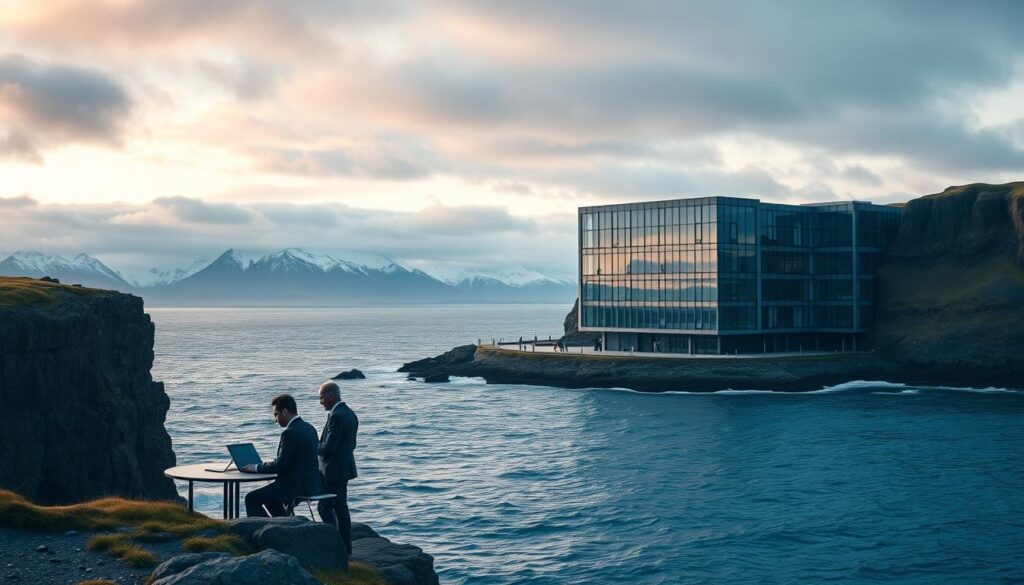In the fast-changing world of today, managing risk in Iceland is more important than ever. With businesses facing many uncertainties, specific risk solutions are key. They protect assets and improve business toughness. This article talks about how these strategies are vital in Iceland. They keep valuable resources safe and help deal with tough situations in uncertain times.
Introduction to Risk Management in Iceland
Risk management in Iceland is getting a lot of focus as businesses tackle unique regional challenges. It mixes global practices with local insights. This aims to safeguard Icelandic companies and make sure they follow all rules, both domestic and global.
Anúncios
When doing business in Iceland, companies face risks like changing economies, environmental hazards, and operational issues. Business risk management in Iceland is about spotting, evaluating, and lessening these risks. By doing so, Icelandic companies become more robust. This helps them deal with unexpected events and shifts in the market.

It’s key to have plans made just for you in risk management. Local experts design strategies to meet the distinct needs of various sectors. This custom approach not only improves the risk management system. It also helps Icelandic firms succeed among tough competition.
Understanding the Importance of Risk Management
Risk management is key to protecting an organization’s future. It’s about more than just keeping assets safe. Knowing the potential risks helps build strong strategies for making good decisions, even when things are uncertain.
Protecting Assets and Building Resilience
Keeping assets safe is at the heart of risk management. By looking ahead and identifying what could go wrong, companies can stop problems before they grow. Being resilient means not just getting back up after a problem, but also learning and growing from the experience. A forward-thinking approach helps build a strong and flexible organization.
Enhancing Decision-Making Under Uncertainty
Making smart decisions is crucial when the future is hard to predict. Leaders who understand the risks can make choices that are good for both now and later. Using well-thought-out risk management methods leads to better results. It helps organizations move forward with confidence and clear vision.
Types of Risk Management Solutions Available
In Iceland, businesses face many risks. There are lots of risk management solutions to help. These solutions help with financial stability, keeping operations going, and following rules. It’s important for companies to understand these solutions to protect their assets and succeed in the long run.
Financial Risk Management
Financial risk management helps companies deal with money risks. It uses strategies like hedging and diversifying. This way, businesses can handle changes in interest rates, currency values, and market demands better. Good financial risk management helps companies stay stable and do well.
Operational Risk Management
Operational risk management is about dealing with risks in daily business tasks. It looks at risks from inside the company and outside events. Companies can use better processes, train employees, and assess risks to improve. This makes sure companies can keep working well, even when things go wrong.
Compliance and Regulatory Risk Management
Compliance and regulatory risk management is about following laws and standards. Companies face many rules, like data protection and financial reporting. Using audits, training, and making policies helps companies lower legal risks and look good in the market.
Strategies for Effective Risk Management
Effective risk management is crucial for companies to protect their assets and keep operations running smoothly. It starts with being proactive about risks and continues with constant watchfulness. These methods guard against possible dangers and make the organization stronger.
Proactive Identification of Risks
Spotting risks early is key to a strong risk management plan. Companies should examine their whole operation to find weak spots. To spot risks, they often:
- Do regular checks to weigh both internal and external risks.
- Ask employees at every level to talk about risks they see.
- Look at past events to guess future risks.
Implementing Mitigation Strategies
After finding risks, it’s important to figure out how to handle them. This might mean making plans to avoid risks or lessen their impact. Effective strategies include:
- Creating detailed emergency plans for different risk situations.
- Giving workers the training and tools they need to deal with risks.
- Setting up ways for quick reporting and handling of risks.
Continuous Monitoring and Review
Keeping an eye on risks is vital for a good risk plan. Companies need to stay alert to changes and adjust their methods. This continuous effort can involve:
- Regular checks to see if risk plans are working.
- Using tech to watch for signs of risk in real time.
- Building a system where feedback helps improve risk management over time.
Technological Innovations in Risk Management
Technology has changed how we handle potential risks. AI and big data now play a big part in risk management. They give us more insight and help make faster decisions.
Utilizing AI and Big Data
AI helps predict and understand risks better. With big data, companies see patterns that could mean new threats. This way, they can get ready and protect themselves better.
Centralized Risk Management Platforms
Central platforms make handling risks easier for companies. They bring together info from different places, showing all possible dangers. This tech support helps businesses stay quick and smart in a fast-paced world.
Iceland’s Unique Challenges in Risk Management
Iceland’s risk management landscape has unique hurdles businesses must tackle. These involve economic vulnerabilities and environmental dangers. Both can lead to big financial losses and disrupt operations. It’s crucial to understand these issues to make effective risk management plans.
Economic Vulnerabilities
Iceland’s economy is strong but faces certain risks. It’s especially sensitive to global market swings. This is due to its heavy reliance on tourism and fishing. These sectors are easily affected by world events. Therefore, Icelandic companies must prepare for both immediate and future economic challenges.
Environmental Risks and Natural Disasters
In Iceland, businesses deal with major environmental threats. This includes volcanic eruptions and harsh weather. Such events can stop business operations and have big financial consequences. Companies need to focus on risk assessment and disaster recovery planning. Being aware of these environmental risks is key to being prepared.
Key Players in Iceland’s Risk Management Sector
In Iceland’s risk management area, there’s a blend of local and international powers at work. They help shape better risk solutions within Iceland. By tapping into both Icelandic expertise and global partnerships, they create strategies that work well worldwide.
Local Firms and Their Expertise
A number of Icelandic firms are well-known for their top-quality work. They cover areas like:
- Financial risk management
- Operational risk assessment
- Compliance and regulatory strategies
These firms understand Iceland’s specific challenges. Their knowledge makes them industry leaders. Working with businesses, they pinpoint and solve unique risks, helping companies stay strong.
International Collaborations and Partnerships
Global partnerships boost Iceland’s risk management capabilities. By working with others worldwide, Icelandic firms bring in new tech and ideas. This exchange of knowledge enhances the local expertise. It leads to better risk management by introducing innovative solutions from everywhere.
Regulatory Framework Governing Risk Management
In Iceland, there’s a system that sets rules for managing risk in business. It makes sure businesses follow local and worldwide rules. It’s very important for companies to get this right if they want to succeed and handle risks well.
Understanding Local Laws and Regulations
Iceland has its own rules that companies need to stick to. These rules cover several important areas:
- Consumer protection laws
- Financial regulations
- Environmental laws
- Labor laws
These rules are there to protect everyone involved and to make sure business is fair. Following these rules is key to keeping a good reputation and running a business smoothly.
Compliance with International Standards
Companies should also match their practices with world standards. It makes sure that they not only follow Icelandic laws but can compete globally too. This usually includes:
- Knowing about international standards like ISO
- Updating policies to fit global best practices
- Keeping an eye on changes in worldwide laws that might affect them
Focusing on local and global rules improves a company’s risk management. It also makes a company more trusted in the market.
Benefits of Engaging with Professional Risk Management Services
Organizations in Iceland are now seeing how great it is to use professional risk management services. With expert help and custom plans, businesses can do better and face less danger. This part talks about how working with risk management pros can help find the right solutions for different needs.
Customized Solutions for Individual Needs
Each company has its own set of challenges. Professional risk management services create custom solutions for these unique issues.
- Assessment of organizational risks specific to the industry
- Development of targeted risk mitigation plans
- Regular reviews to adapt strategies as conditions change
This personalized approach lets companies tackle problems with confidence and clear vision.
Access to Expertise and Knowledge
Working with experts gives companies a big advantage. They get to tap into a wide range of knowledge about what works best, staying compliant, and new tools for managing risks. This lets them:
- Enhance decision-making processes
- Utilize advanced tools for risk analysis and tracking
- Stay ahead of emerging trends and challenges
By choosing to work with professional risk management services, companies are better prepared. They can handle risks well and stand out in a tough market.
Success Stories: Effective Risk Management in Action
In Iceland, several businesses have shown the power of good risk management strategies. Their success stories serve as important examples of how effective risk management can work in different fields. By looking at these examples, other companies can learn and apply similar strategies in their operations.
Case Studies of Icelandic Businesses
In Iceland, various organizations have become successful by focusing on risk management. Among them are:
- Reykjavik Energy – This company has dealt with economic ups and downs and environmental issues by using thorough risk management. Their approach helped them keep offering steady services.
- Íslandsbanki – By using cutting-edge analysis tools, this bank spotted financial risks early. This allowed them to act quickly to protect the interests of their stakeholders.
- Landspítali National University Hospital – The hospital improved patient care and staff safety by sticking to strict health and safety rules. This helped them decrease operational risks.
Lessons Learned and Best Practices
The lessons from these risk management case studies in Iceland teach us several things. Important points are:
- Always be proactive in identifying risks to stop problems before they grow.
- Make sure risk management plans are customized to your organization’s needs.
- Encourage a workplace where everyone knows the importance of spotting and dealing with risks.
Conclusion
The insights in this article highlight why managing risks well is key in Iceland. Businesses there deal with many challenges, from economy issues to nature’s threats. They must use smart strategies to handle these tough situations.
Making risk management a core part of how a business runs helps protect its resources. It also makes the business stronger in a world that keeps changing. Icelandic companies can do better by staying ahead, using new tech, and always being ready to adapt.
This article wraps up by saying managing risks is a continuous process. It takes hard work, knowledge, and teamwork with local and international partners. This makes sure businesses can grow and overcome any dangers they might face. Investing in these methods is key for the future success of Icelandic firms.
FAQ
What is the significance of risk management solutions in Iceland?
What types of risk management solutions are available to businesses in Iceland?
How can businesses effectively identify and manage risks?
What role does technology play in risk management?
What are the unique challenges faced by Icelandic businesses regarding risk management?
Who are the key players in Iceland’s risk management sector?
What does the regulatory framework for risk management in Iceland entail?
How can professional risk management services benefit businesses?
Are there real-world examples of successful risk management in Iceland?
Conteúdo criado com auxílio de Inteligência Artificial



